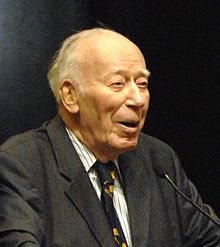Ken Hechler
Kenneth William "Ken" Hechler (born September 20, 1914 near Roslyn , Long Island , New York ; † December 10, 2016 in Romney , West Virginia ) was an American politician . Between 1959 and 1977 he represented the fourth constituency of the State of West Virginia in the US House of Representatives .
Early years and political advancement

Ken Hechler attended Roslyn High School until 1931 . He then studied until 1935 at Swarthmore College in Pennsylvania and then until 1936 at Columbia University in New York City . Subsequently, he was a faculty member at Columbia University, Marshall University and Princeton University . Until the outbreak of the Second World War he held a few subordinate offices in the public service. During the war he was used as an officer in the US Army in the European theater of war. He worked as a translator and military historian. Based on his observations, he later wrote the book Die Brücke von Remagen , which was successfully made into a film . Before the Nuremberg trials he interrogated several defendants, including Hitler's deputy Hermann Göring .
After his return to the United States, Hechler was also politically active as a member of the Democratic Party . Between 1949 and 1953 he was special advisor to US President Harry S. Truman . From 1953 to 1956 he was a director of the American Political Science Association in Washington . In 1956 he supported Adlai Stevenson's unsuccessful presidential campaign . In 1957 he served on the staff of US Senator John A. Carroll from Colorado . Between 1964 and 1984, with the exception of 1976, Hechler was a delegate to the respective Democratic National Conventions .
Congressman
In the congressional elections of 1958, Hechler was elected to the US House of Representatives in Washington in the fourth district of West Virginia, where he succeeded Republican Will E. Neal on January 3, 1959 . After eight re-elections, he was able to complete nine legislative terms in Congress by January 3, 1977 . During this time, the Vietnam War and the Watergate Affair took place . Hechler was considered very liberal. Among other things, he successfully campaigned for the improvement of safety regulations in the mines. He also supported the civil rights movement .
In 1976 he declined to run for Congress again. Instead, he ran unsuccessfully for governor of West Virginia; in his party's primary elections he was defeated by Jay Rockefeller . In the following years, Hechler also worked as a television and newspaper journalist. In 1978 and 1990 he ran unsuccessfully for his return to Congress. Between 1980 and 1982 he was a scientific advisor to the Congressional Science and Technology Committee. From 1981 to 1984 he lectured at the University of Charleston and Marshall University. Between 1985 and 2001, Hechler served as Secretary of State, the executive officer of the West Virginia government. In 2004 he was not re-elected, which was mainly due to his age of 90 years. From then on, despite his age, he gave historical lectures.
In 2010, Hechler ran for the Senate seat of the late Robert Byrd , but lost his party's primary to West Virginia Governor Joe Manchin . Following the death of Perkins Bass in 2011, Hechler was the oldest living MP in the US House of Representatives and all of Congress until his death in 2016.
Web links
- Ken Hechler in the Biographical Directory of the United States Congress (English)
- Ken Hechler in the nndb (English)
- Ken Hechler in the Internet Movie Database (English)
| personal data | |
|---|---|
| SURNAME | Hechler, Ken |
| ALTERNATIVE NAMES | Hechler, Kenneth William (full name) |
| BRIEF DESCRIPTION | American politician |
| DATE OF BIRTH | September 20, 1914 |
| PLACE OF BIRTH | Roslyn , New York |
| DATE OF DEATH | December 10, 2016 |
| Place of death | Romney , West Virginia |



